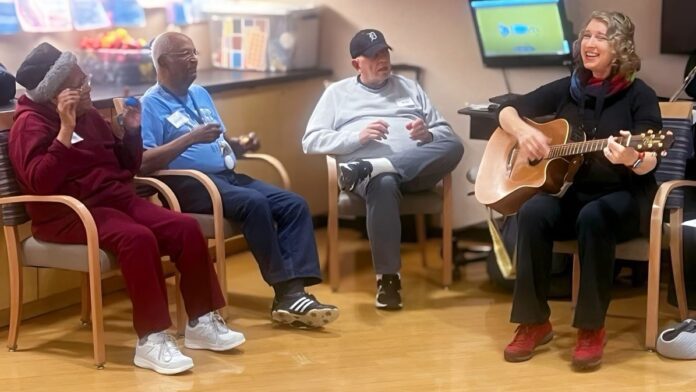
SOUTHFIELD, Mich. – The Dorothy and Peter Brown Jewish Community Adult Day Program will be holding an open house and presentation featuring a neurologist with expertise in Alzheimer’s Disease, on Aug. 13 at 6:30 p.m. in Southfield (29699 Southfield Road).
The Brown Center, which provides innovative and engaging activities, care, and socialization for those living with dementia along with support for their families, has locations in Southfield and West Bloomfield and is a partnership between Gesher Human Services and Jewish Senior Life. The aim of the event, Alzheimer’s Through the Stages: A Guide for Patients and Families, is to help Metro Detroit families navigate an Alzheimer’s diagnosis, find out about support available and learn about some of the newest FDA treatments which offer hope, plus other treatments on the horizon. According to the Alzheimer’s Association there are 203,000 people living with Alzheimer’s and other forms of dementia in Michigan.
Presenter Dr. Daniel Singer, a neurologist at MIND (The Michigan Institute for Neurological Disorders), said that it was now easier for people to get diagnosed earlier because of tools such as PET scans, genetic tests and blood tests.
“Patients are coming to us earlier, with families not accepting that symptoms are due to senility and normal aging – and that’s good, because the treatments we have work best when people have their earliest and mildest symptoms,” he explained.
In the UK, actress Dame Judi Dench partnered with the Alzheimer’s Research UK in June to campaign for patients to get earlier diagnosis of their symptoms, saying that a delayed diagnosis led to people missing out on vital support, the chance to plan ahead, opportunities to get involved in research, and on precious time. “A diagnosis may not fix everything, but it gives people understanding, clarity, and some control at a time when everything feels uncertain,” she said in a statement.
There are new FDA approved medications and a blood biomarker that may make early diagnosis and treatments easier, according to Dr. Singer. New treatments include infusions of monoclonal antibodies which generate a response in the immune system which may help to clear amyloid plaques in the brain associated with the disease. Dr. Singer said that large clinical memory centers are now using the two treatments, which are either given once or twice a month, to help to slow down the progression of the disease. “The hope is that these prolong the patient’s very early symptoms long enough for us to get a cure,” he said. Dr. Singer also highlighted tau protein, a biomarker in the blood which opens up the possibility of easier testing.
The Brown Center event will start with a tour at 6:30 p.m. followed by a presentation at 6:45 p.m. There will also be time for questions and answers plus additional tours after that.
Director of the Brown Center Debi Banooni said that it was very important for families to understand the different stages of the disease, resources available and treatments that might be able to help. “We also hope that the program will trigger questions that attendees can then take to their own family physician about clinicals tests and possible medications,” she added.
Banooni added the Brown Center was committed to assisting care partners to be the most effective they could be. “Supporting caregivers and giving them as much information as possible to look after their loved ones is a vital part of our mission,” she said.
The event is generously sponsored by the Dee dee and Michael Perlman Caregivers Fund. To register for the program, preferably by August 8, email Joanna Dorfman at [email protected] or call 248.661.6390 ext. 1.



